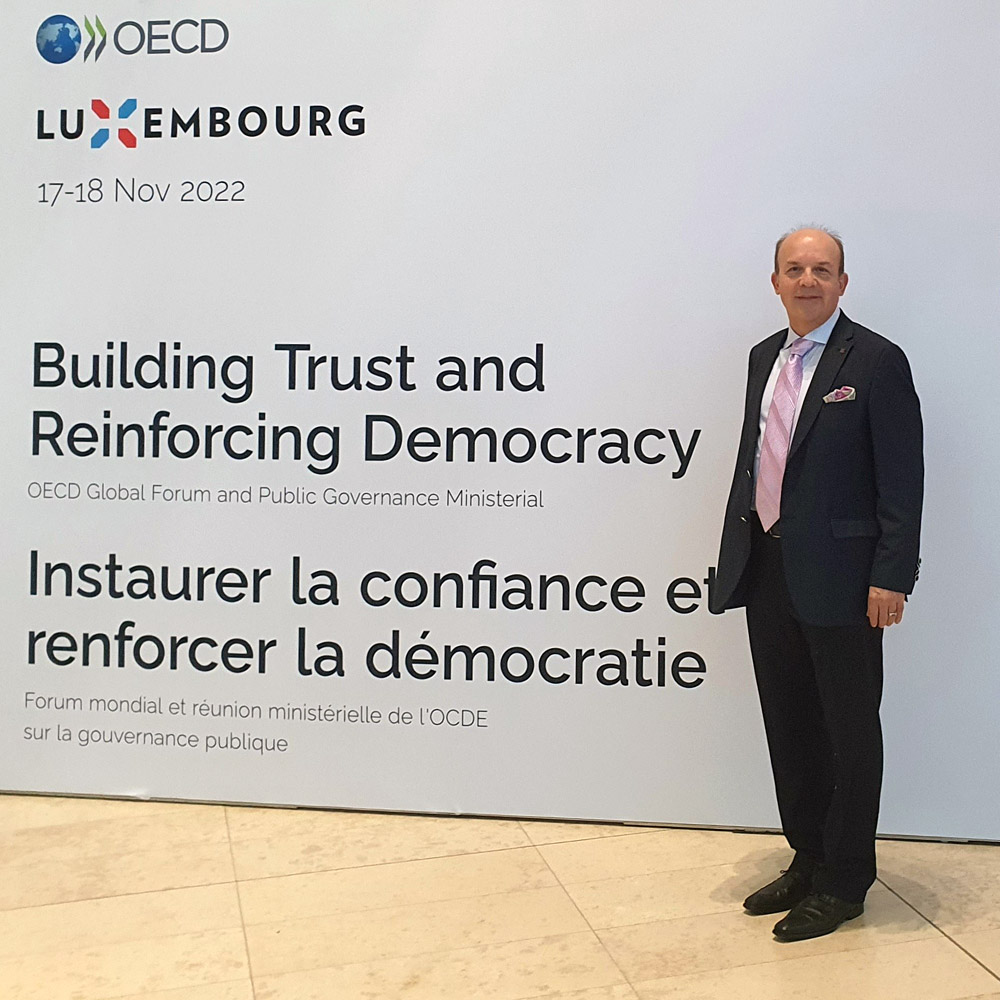-
Business at OECD, Governance Committee Chairman, Dr. Yılmaz Argüden’s Comments for the Plenary Session on Public Governance: Responses to Mis- and Dis- Information
Dear Chair, Dear Ministers, Dear Distinguished Colleagues,
We first wanted to thank the OECD Secretariat for the opportunity to speak at this important OECD Public Governance Committee meeting and wish to congratulate the OECD for the work on Trust and Luxembourg Government for hosting the first Ministerial on Building Trust and Reinforcing Democracy
As you know, Business at OECD, is the official business voice to the OECD and this year we celebrated our 60th anniversary of our strong partnership with the OECD.
We have worked with the OECD from the very start, and for over six decades we have played an instrumental role in the design and implementation of many OECD landmark agreements:
- From the adoption of the OECD Guidelines for Multinational Enterprises and related investment instruments in 1976, the Export Credit Arrangements in 1978, the OECD Anti-Bribery Convention in 1999, the Recommendation of the Council on Regulatory Policy and Governance in 2012, and the recent ground-breaking agreements on tax and instruments on digital, to name just a few.
Today, we are delighted to participate in the important discussions taking place at this OECD Ministerial meeting on ‘Building Trust and Reinforcing Democracy’ as trust is the essence of good governance and foundation of sustainable development. Trust for democracy could only be built by adopting a (i) whole of society, (ii) whole of government, and (iii) whole the policy cycle approach that focuses on (a) informed, inclusive stakeholder engagement, (b) evidence-based decision making supported by ex-ante and ex-post impact analysis, and (c) integrated thinking to support continuous learning.
In the current global context, preserving and promoting the democratic system is of utmost importance and we hence welcome the focus of the Public Governance Ministerial meeting and regard the strengthening of democracies as a priority since strong democracies significantly contribute to the respect of human rights and to increased trust in public institutions. Simultaneously, it also results in a more transparent business environment with less corruption and thus more foreign direct investment that contributes to jobs, higher productivity, and economic growth.
For this Ministerial meeting, Business at OECD (BIAC) prepared a policy paper that has benefited from input from our member organizations and a wide range of their member companies. It was submitted by our Executive Director, Hanni Rosenbaum to Ms. Elsa Pilichowski and is available in our website and social media. In particular, the paper provides recommendations for the OECD on how to address two relevant subjects for this ministerial: Combatting Mis- and Dis- information and developing Digital Rights.
On Mis- and Dis-information we would like to highlight the following five points:
- A clear definition of mis- and dis- information is needed among governments and multilateral institutions. Defining the illegal qualification is a crucial step when addressing this global issue to determine which information can be online and which cannot. Establishing a common principle agreed at OECD level can allow an efficient approach, as it would provide both business and governments greater legal clarity vis-à-vis potential regulations.
- Mis- and Dis- information harm business interests, both due to the difficulty in moderating content posted online by private users and entities, and the quasi-impossibility to control the spread of Mis- and Dis-information. Hence, it can severely damage the trust, reputation, and perception of business ultimately affecting revenues and business operations at large.
- Rights and responsibilities over data: It is important to address the question of the legal responsibility over the spread of mis- and dis-information online taking into account fundamental rights such as freedom of speech. In this context, it will be helpful to have guidance from the OECD and to do this in harmonization with existing guidance, such as the EU’s Digital Services Act. Additionally, it is crucial to acknowledge the potential harmful impact of mis- and dis-information with regards to the development of algorithms and their predictions when they build on data available online (i.e., autonomous cars).
- Education: Governments should promote education programs on digital media literacy that can provide citizens with tools to identify Mis- and Dis- information and prevent its (further) circulation online. Moreover, education programs on digital media literacy should not only be at school level but across all age groups.
- International cooperation: Cooperation at international level on this matter is necessary, given the cross-border and global impact of Mis- and Dis-Information. If the OECD membership of like-minded countries makes it the ideal forum to tackle the issue, other multilateral institutions such as the Council of Europe and the United Nations are undertaking similar work. It is necessary that the OECD engages in tight cooperation with other multilateral institutions to avoid duplication of work, recommendations, and legislation that would disrupt business.
Finally, I wanted to thank you again for your attention and the OECD of their longstanding cooperation. We look forward to continuing our discussions on these crucial subjects and hope that you find our policy paper insightful.
